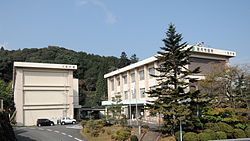Nantan (南丹市, Nantan-shi) is a city located in Kyoto Prefecture, Japan. As of 1 May 2022[update], the city had an estimated population of 30,744 in 14406 households and a population density of 50 persons per km2 (130 per sq. mi.).[1] The total area of the city is 616.40 square kilometres (237.99 sq mi).
Nantan
南丹市 | |
|---|---|
 Nantan City hall | |
 Location of Nantan in Kyoto Prefecture | |
| Coordinates: 35°6′N 135°28′E / 35.100°N 135.467°E | |
| Country | Japan |
| Region | Kansai |
| Prefecture | Kyoto |
| Government | |
| • Mayor | Yohei Nishimura (since April 2014) |
| Area | |
• Total | 616.40 km2 (237.99 sq mi) |
| Population (May 1, 2022) | |
• Total | 30,744 |
| • Density | 50/km2 (130/sq mi) |
| Time zone | UTC+09:00 (JST) |
| City hall address | 47 Kozakura, Sonobe-cho, Nantan-shi, Kyoto-fu 622-8651 |
| Climate | Cfa |
| Website | Official website |
| Symbols | |
| Bird | Blue-and-white flycatcher |
| Flower | Cherry blossom |
| Tree | Fagus crenata |

Geography
editNantan is located in the southern part of the Tamba region in central Kyoto Prefecture.
Neighbouring municipalities
editFukui Prefecture
Hyōgo Prefecture
Kyoto Prefecture
Osaka Prefecture
Shiga Prefecture
Climate
editNantan has a humid climate (Köppen Cfa) characterized by warm, wet summers and cold winters with heavy snowfall. The average annual temperature in Nantan is 13.0 °C (55.4 °F). The average annual rainfall is 1,808.3 mm (71.19 in) with July as the wettest month. The temperatures are highest on average in August, at around 25.2 °C (77.4 °F), and lowest in January, at around 1.7 °C (35.1 °F).[2] Its record high is 36.7 °C (98.1 °F), reached on 27 July 2023, and its record low is −11.8 °C (10.8 °F), reached on 28 February 1981.[3]
| Climate data for Nantan (1991−2020 normals, extremes 1978−present) | |||||||||||||
|---|---|---|---|---|---|---|---|---|---|---|---|---|---|
| Month | Jan | Feb | Mar | Apr | May | Jun | Jul | Aug | Sep | Oct | Nov | Dec | Year |
| Record high °C (°F) | 16.9 (62.4) |
21.1 (70.0) |
24.4 (75.9) |
29.8 (85.6) |
31.9 (89.4) |
33.6 (92.5) |
37.7 (99.9) |
37.2 (99.0) |
36.2 (97.2) |
30.8 (87.4) |
25.0 (77.0) |
21.8 (71.2) |
37.7 (99.9) |
| Mean daily maximum °C (°F) | 6.2 (43.2) |
7.0 (44.6) |
11.5 (52.7) |
17.8 (64.0) |
22.9 (73.2) |
25.8 (78.4) |
29.7 (85.5) |
31.2 (88.2) |
26.6 (79.9) |
20.9 (69.6) |
15.2 (59.4) |
9.2 (48.6) |
18.7 (65.6) |
| Daily mean °C (°F) | 1.7 (35.1) |
2.1 (35.8) |
5.6 (42.1) |
11.1 (52.0) |
16.2 (61.2) |
20.3 (68.5) |
24.3 (75.7) |
25.2 (77.4) |
21.2 (70.2) |
15.1 (59.2) |
9.4 (48.9) |
4.2 (39.6) |
13.0 (55.5) |
| Mean daily minimum °C (°F) | −1.3 (29.7) |
−1.5 (29.3) |
0.7 (33.3) |
5.0 (41.0) |
10.4 (50.7) |
15.8 (60.4) |
20.5 (68.9) |
21.0 (69.8) |
17.1 (62.8) |
11.0 (51.8) |
5.2 (41.4) |
0.7 (33.3) |
8.7 (47.7) |
| Record low °C (°F) | −11.2 (11.8) |
−11.8 (10.8) |
−8.7 (16.3) |
−3.3 (26.1) |
1.3 (34.3) |
4.2 (39.6) |
11.9 (53.4) |
12.8 (55.0) |
6.7 (44.1) |
1.3 (34.3) |
−3.7 (25.3) |
−6.6 (20.1) |
−11.8 (10.8) |
| Average precipitation mm (inches) | 140.3 (5.52) |
128.5 (5.06) |
139.5 (5.49) |
121.9 (4.80) |
149.7 (5.89) |
177.1 (6.97) |
205.1 (8.07) |
148.8 (5.86) |
202.3 (7.96) |
161.7 (6.37) |
107.3 (4.22) |
126.3 (4.97) |
1,808.3 (71.19) |
| Average snowfall cm (inches) | 73 (29) |
73 (29) |
9 (3.5) |
0 (0) |
0 (0) |
0 (0) |
0 (0) |
0 (0) |
0 (0) |
0 (0) |
0 (0) |
26 (10) |
179 (70) |
| Average precipitation days (≥ 1.0 mm) | 17.9 | 16.2 | 15.4 | 11.9 | 11.3 | 12.6 | 12.7 | 9.2 | 12.0 | 11.4 | 12.3 | 16.1 | 159 |
| Average snowy days (≥ 3 cm) | 6.9 | 6.6 | 1.0 | 0 | 0 | 0 | 0 | 0 | 0 | 0 | 0 | 2.2 | 16.7 |
| Mean monthly sunshine hours | 74.1 | 85.3 | 124.1 | 168.2 | 184.3 | 129.9 | 136.9 | 177.1 | 126.5 | 128.5 | 109.5 | 88.0 | 1,533.8 |
| Source: Japan Meteorological Agency[3][2] | |||||||||||||
| Climate data for Sonobe, Nantan (2002−2020 normals, extremes 2002−present) | |||||||||||||
|---|---|---|---|---|---|---|---|---|---|---|---|---|---|
| Month | Jan | Feb | Mar | Apr | May | Jun | Jul | Aug | Sep | Oct | Nov | Dec | Year |
| Record high °C (°F) | 17.3 (63.1) |
21.5 (70.7) |
24.6 (76.3) |
31.1 (88.0) |
33.0 (91.4) |
35.6 (96.1) |
39.1 (102.4) |
38.5 (101.3) |
37.8 (100.0) |
31.8 (89.2) |
25.2 (77.4) |
22.5 (72.5) |
39.1 (102.4) |
| Mean daily maximum °C (°F) | 7.7 (45.9) |
9.0 (48.2) |
13.0 (55.4) |
19.1 (66.4) |
24.4 (75.9) |
27.4 (81.3) |
31.0 (87.8) |
32.8 (91.0) |
28.3 (82.9) |
22.2 (72.0) |
16.3 (61.3) |
10.3 (50.5) |
20.1 (68.2) |
| Daily mean °C (°F) | 2.2 (36.0) |
3.3 (37.9) |
6.5 (43.7) |
12.0 (53.6) |
17.5 (63.5) |
21.6 (70.9) |
25.4 (77.7) |
26.4 (79.5) |
22.4 (72.3) |
15.9 (60.6) |
9.7 (49.5) |
4.4 (39.9) |
13.9 (57.1) |
| Mean daily minimum °C (°F) | −2.0 (28.4) |
−1.4 (29.5) |
0.6 (33.1) |
5.2 (41.4) |
11.3 (52.3) |
16.9 (62.4) |
21.5 (70.7) |
22.0 (71.6) |
17.9 (64.2) |
11.1 (52.0) |
4.6 (40.3) |
−0.1 (31.8) |
9.0 (48.1) |
| Record low °C (°F) | −10.8 (12.6) |
−10.5 (13.1) |
−5.5 (22.1) |
−3.2 (26.2) |
1.6 (34.9) |
8.1 (46.6) |
15.0 (59.0) |
13.9 (57.0) |
9.1 (48.4) |
0.8 (33.4) |
−3.9 (25.0) |
−12.8 (9.0) |
−12.8 (9.0) |
| Average precipitation mm (inches) | 60.8 (2.39) |
78.4 (3.09) |
115.2 (4.54) |
117.4 (4.62) |
129.8 (5.11) |
166.5 (6.56) |
205.3 (8.08) |
159.5 (6.28) |
200.3 (7.89) |
162.9 (6.41) |
72.9 (2.87) |
77.6 (3.06) |
1,570.2 (61.82) |
| Average precipitation days (≥ 1.0 mm) | 10.2 | 11.4 | 11.6 | 10.8 | 9.8 | 12.0 | 12.6 | 8.9 | 10.5 | 9.1 | 8.2 | 9.7 | 124.8 |
| Mean monthly sunshine hours | 103.4 | 107.4 | 151.4 | 179.6 | 191.9 | 140.6 | 142.7 | 193.4 | 147.3 | 142.1 | 117.8 | 109.4 | 1,729.6 |
| Source: Japan Meteorological Agency[4][5] | |||||||||||||
Demographics
editPer Japanese census data,[6] the population of Nantan has declined slightly in recent decades.
| Year | Pop. | ±% |
|---|---|---|
| 1960 | 45,262 | — |
| 1965 | 41,853 | −7.5% |
| 1970 | 39,318 | −6.1% |
| 1975 | 38,409 | −2.3% |
| 1980 | 38,215 | −0.5% |
| 1985 | 37,709 | −1.3% |
| 1990 | 36,693 | −2.7% |
| 1995 | 37,841 | +3.1% |
| 2000 | 37,617 | −0.6% |
| 2005 | 36,736 | −2.3% |
| 2010 | 35,214 | −4.1% |
| 2015 | 33,145 | −5.9% |
| 2020 | 31,629 | −4.6% |
| Nantan population statistics[6] | ||
History
editThe area of the modern town of Nantan was within ancient Tanba Province, and may have been the site of the provincial capital in the Nara period. During the Edo Period, Sonobe Domain was located within its borders. The town of Sonobe was established with the creation of the modern municipalities system on April 1, 1889. Sonobe merged with the neighboring towns of Hiyoshi, and Yagi (all from Funai District), and the town of Miyama (from Kitakuwada District) to form the city of Nantan on January 1, 2006.
Government
editNantan has a mayor-council form of government with a directly elected mayor and a unicameral town council of 22 members. Nantan, together with the town of Kyōtamba contributes one member to the Kyoto Prefectural Assembly. In terms of national politics, the city is part of Kyoto 4th district of the lower house of the Diet of Japan.
Economy
editNantan has an economy based on regional commerce, agriculture and forestry. The main products include mizuna and other "Kyoto vegetables".
Education
editColleges and universities
edit- Bukkyo University, Sonobe campus
- College of Medical Technology Meiji University of Oriental Medicine
- Kyoto College of Medical Technology
- Kyoto University of Arts and Crafts
- Meiji University of Integrative Medicine
Primary and secondary schools
editNantan has seven public elementary schools and five public middle schools operated by the city government and three public high schools operated by the Kyoto Prefectural Department of Education. There is also one private middle school and one private high school. The prefecture also operates one special education school for the handicapped.
Transportation
editRailway
editJR West – San'in Main Line / Sagano Line
Highway
editSister cities
edit- Clutha District, New Zealand[7]
- Manila, Philippines[7]
Local attractions
editSights include the Rurikei Prefectural Natural Park and Miyama Kayabuki-no-Sato. Miyama Kayabuki-no-Sato is a small village that consists of cottages made with thatched (kayabuki) roofs and showcase the classic and traditional scenery of Japan. Within this town is a museum that exhibits the history and agriculture used to make these famous thatched houses, located in what is known as the Miyama Archive of Local History and Folklore. Upon visitation, it is also possible to go in and walk around a few of these houses to experience the history first hand. [8]
Noted people from Nantan
edit- Makoto Fujita – actor
- Shigeru Miyamoto – video game designer and creator of Mario and The Legend of Zelda
- Yasuhiro Nakagawa – politician
- Hiromu Nonaka – politician
- Bonnie Pink – singer-songwriter
- Yoshimi Tanaka – politician
References
edit- ^ "Nantan city official statistics" (in Japanese). Japan.
- ^ a b 気象庁 / 平年値(年・月ごとの値). JMA. Retrieved March 26, 2022.
- ^ a b 観測史上1~10位の値(年間を通じての値). JMA. Retrieved March 26, 2022.
- ^ 観測史上1~10位の値(年間を通じての値). JMA. Retrieved March 29, 2022.
- ^ 気象庁 / 平年値(年・月ごとの値). JMA. Retrieved March 29, 2022.
- ^ a b Nantan population statistics
- ^ a b "Sister cities, towns and villages of Kyoto Prefecture". Kyoto Prefecture Website. Retrieved 5 February 2015.
- ^ Nnantan Fanantan fan - 公式ホームページ. (n.d.). https://www.city.nantan.kyoto.jp/www/even/122/000/000/45103/00045117002.pdf
External links
edit- Media related to Nantan, Kyoto at Wikimedia Commons
- Nantan City official website (in Japanese) (some English)


